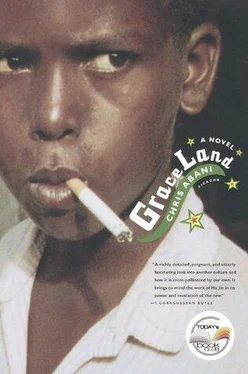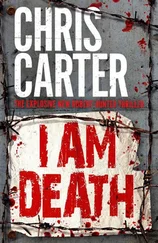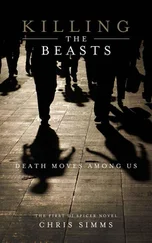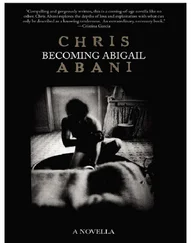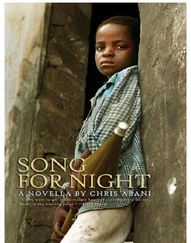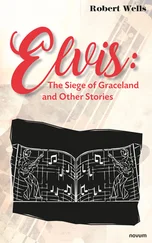Elvis wasn’t sure how late it was, but he had left the motor park at ten and it was a good fifteen-minute trip, even at a fast jog. He paused in the shadows of the guava trees out back. Had he been found out? Was his father sitting on his bed right now, waiting for Elvis to climb through the window? Was he weighing a cane to beat Elvis with, seeking the balance of its heft, trying its springiness against the air and whining mosquitoes?
Elvis’s mind raced. Best to carry out a proper rekky. That was one of his favorite words, learned from Uncle James, who had been a captain in the Biafran war, where he’d carried out many recon missions, or rekkies, and who was forever carrying out, or asking someone to carry out, a proper rekky.
Melting from shadow to shadow, Elvis approached the front yard, pausing to note several unfamiliar cars parked there. The front door was wide open and light from inside spilled out, cutting a swathe in the darkness, patterning the parked cars with shadows from the hibiscus shrubs that grew along the front of the house. Voices raised in argument spilled out onto the wood of the veranda, which, adjusting in the cool of night, creaked in response. These were all good signs. It meant his father was still up because he had guests, not because he had found Elvis out.
Curious, and using the hibiscus as camouflage, he peered over the windowsill. His father, Uncle Joseph and several men he did not know were arguing. In the corner, tied hand and foot, was his cousin Godfrey. Watching over him, eyes alert and hard, was another cousin, Innocent.
While Godfrey, Efua’s brother, was his first cousin, Innocent was one of those relatives that English terms could not properly identify in the tangled undergrowth of the Igbo extended family: distant enough not to be a real cousin yet close enough to be a brother.
Elvis absently wondered why Godfrey was tied up. No doubt the heated debate revolved around him and was probably an attempt to come up with a suitable punishment for something he had done. Godfrey was a real troublemaker, and his fighting and stealing shamed the family. There were few crimes more heinous than bringing shame to one’s family, and Elvis was used to seeing him tied up and beaten.
Well, that settles it, he thought. He was not about to miss a beating, seeing as he was not the one getting beaten. Beatings were Uncle Joseph’s specialty. He had an unerring accuracy with the cane, which meant that it landed on the same welt repeatedly until you felt like a hot wire was buttering through your flesh. And he always sent you out to cut the cane for your own whipping.
“A bad cane doubles de punishment,” he would call out cheerfully to your dead-man-walking figure.
Retreating to a tree that afforded a direct view into the parlor from a comfortable yet out-of-sight perch, he settled down to watch. Plucking a guava, he wiped it on his shorts and bit into the sweet flesh. Around him, in the other trees, he could hear bats feasting on the ripe fruit. They kept away from his tree, repelled by his human odor and the scent of cigarettes.
He must have dozed off, because the muffled sound of people talking underneath the tree woke him. Innocent and Uncle Joseph were huddled in some kind of negotiation. Though he could not hear the words, there was something sinister in their manner that disturbed and frightened him. Sitting, barely daring to breathe, he strained to hear, but their voices were too low, as though the men were afraid the shadows might hear. The conversation was short and both men returned to the parlor, but not before a bundle of money changed hands. Shortly after, Innocent and a now untied Godfrey walked out and headed quickly into the night.
Climbing down, Elvis hastily worked his way around to the back of the house. He was just about to climb in through the window when he heard his father calling his name from the open door of the bedroom. As his eyes adjusted to the dark, he stared straight at him, but his father had no idea that Elvis was outside, only a few feet away. Changing tactic, Elvis stumbled around to the side door, yawning.
“Yes, sir,” he answered.
“Where have you been?” his father demanded, filling the doorway. “Why are you not in bed?”
“I went to piss, sir.” Elvis’s face and eyes were still sleep-swollen from his nap in the tree, and it was an easy sell.
“Get back to bed now, stupid child,” his father snarled before heading back down the corridor to the parlor. With each step his disposition changed, until with a cheery “Where were we?” he returned to his guests.
Elvis shook his head and slipped into his room.
“You have de devil’s luck,” Aunt Felicia muttered from her cot across from him. They shared a room, but she had wisely kept out of the exchange with his father. “But even de devil runs out of luck. Lucifer fell. Remember dat.”
Elvis crawled into bed silently and fell asleep as soon as his head hit the pillow to dream of cowboys and superheroes and naked angels who teased his lust cruelly.
SABICEA CALYCINA BENTH.
(Yoruba: Jiri)
This is a slender plant found mainly in forests that exhibits creeping and climbing characteristics. The leaves are pointed at the apex and heart-shaped at the base. It has white flowers and blue-black berries.
Ground, the leaves are applied to the limbs of young children to help them walk on their own. Crushed and added to palm wine, the leaves serve as a laxative. They can also be used on cuts and wounds. Drunk in infusion, the leaves are said to improve memory. Sometimes ginger is added for taste, and to sharpen the edge of the recollections.
The oldest man in the gathering must offer it to the guests.
One does not rush into the kola-nut ritual either. There is a strict protocol to hospitality. The guest is first offered a glass of water. Next, he is presented with the nzu, or white chalk spoon. This is a large wooden spoon covered by rubbings from the ritual white chalk, or nzu, with a residual piece of the chalk left on it.
Lagos, 1983
Tinubu Square, nicknamed Freedom Square, was milling with people. There were the usual students, poets, musicians, actors, liberals, lecturers and plenty of hippie types. They sat in groups talking, drinking or eating. Elvis hung on the edges of these groups, looking for an opportunity to join one, all the while scanning for the King.
Freedom Square also supported plenty of hawkers, selling everything from alcohol, kebabs, suya and cigarettes to bars of soap and decks of cards. Hovering on the fringes, hugging the shadows, were the drug dealers. They sold reefers of marijuana, amphetamines and other tablets to addicts. But the trade was conducted curiously. The buyer and the seller never faced each other. The entire transaction was carried out back-to-back, and the two parties appeared to be totally unaware of each other’s presence.
The King of the Beggars got up onstage and began plucking reluctant chords from a battered out-of-tune guitar. The crowd grew silent as he performed a series of tone poems. He was talking about the beauty of the indigenous culture that had been abandoned for Western ways. It was essentialist, maybe even prejudiced, because the culture he spoke of was that of the Igbo, only one of nearly three hundred indigenous people in this populous country. He spoke of the ancient systems of governance that were like a loose democracy, leaning more to a socialist system, a governance based on age-grades that gathered to discuss the way forward in any crisis. This system produced a tight-knit community, where the good of the group was placed before individual stake. He spoke of the evils of capitalism that the United States of America practiced — a brand of capitalism, he said, that promoted the individual interest over the communal. It was a land of vice and depravity, infested with a perverse morality based on commercial value rather than a humanistic one. The King called for everyone to return to the traditional values and ways of being. Elvis wasn’t completely convinced, though. The King’s rather preachy sermon sounded a lot like the ideas of Obafemi Awolowo, an independence advocate from the early days of the nation. Elvis’s main problem with the King’s theories was that they didn’t account for the inherent complications he knew were native to this culture, or the American. As naive as Elvis was, he knew there was no way of going back to the “good old days,” and wondered why the King didn’t speak about how to cope with these new and confusing times. But Elvis was mesmerized by the richness of the King’s voice. It was seductive, eliciting the listener’s trust, and he soon forgot his concerns and began to believe the King was right.
Читать дальше
